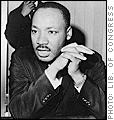Martin Luther King, Jr., Holiday

Who originated the idea of a national holiday in honor of MLK?
by Shmuel Ross and David Johnson
Martin Luther King Day is a federal holiday observed on the third Monday in January. In 2015, it falls on Jan. 19.  |
It took 15 years to create the federal Martin Luther King, Jr., holiday. Congressman John Conyers, Democrat from Michigan, first introduced legislation for a commemorative holiday four days after King was assassinated in 1968. After the bill became stalled, petitions endorsing the holiday containing six million names were submitted to Congress.
Conyers and Rep. Shirley Chisholm, Democrat of New York, resubmitted King holiday legislation each subsequent legislative session. Public pressure for the holiday mounted during the 1982 and 1983 civil rights marches in Washington.
Congress passed the holiday legislation in 1983, which was then signed into law by President Ronald Reagan. A compromise moving the holiday from Jan. 15, King's birthday, which was considered too close to Christmas and New Year's, to the third Monday in January helped overcome opposition to the law.
National Consensus on the Holiday
A number of states resisted celebrating the holiday. Some opponents said King did not deserve his own holiday—contending that the entire civil rights movement rather than one individual, however instrumental, should be honored. Several southern states include celebrations for various Confederate generals on that day. Arizona voters approved the holiday in 1992 after a tourist boycott. In 1999, New Hampshire changed the name of Civil Rights Day to Martin Luther King, Jr., Day.
MLK Holiday Timeline | |
|---|---|
| 1968 |  Martin Luther King, Jr. assassinated; Rep. John Conyers, D-Mich., introduces legislation for federal holiday to commemorate King |
| 1973 | Illinois is first state to adopt MLK Day as a state holiday |
| 1983 | Congress passes, President Reagan signs, legislation creating Martin Luther King, Jr. Day |
| 1986 | Federal MLK holiday goes into effect |
| 1987 | Arizona governor Evan Mecham rescinds MLK Day as his first act in office, setting off a boycott of the state. |
| 1989 | State MLK holiday adopted in 44 states |
| 1991 | The NFL moves the 1993 Super Bowl site from Phoenix, Ariz., to Pasadena, Calif., because of the MLK Day boycott. |
| 1992 | Arizona citizens vote to enact MLK Day. The Super Bowl is held in Tempe, Ariz. in 1996. |
| 1993 | For the first time, MLK Day is held in some form—sometimes under a different name, and not always as a paid state holiday—in all fifty states. |
| 1999 | New Hampshire becomes the last state to adopt MLK Day as a paid state holiday, replacing its optional Civil Rights Day. |
| 2000 | Utah becomes the last state to recognize MLK Day by name, renaming its Human Rights Day state holiday. South Carolina becomes the last state to make MLK Day a paid holiday for all state employees. Until now, employees could choose between celebrating it or one of three Confederate-related holidays. |
| See also: Timeline: MLK's Life and Career, Martin Luther King Speeches | |
